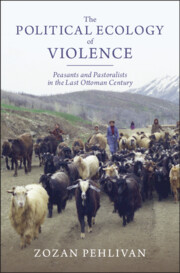
- Cited by 1
-
Cited byCrossref Citations
This Book has been cited by the following publications. This list is generated based on data provided by Crossref.
White, Sam Collet, Dominik Alcoberro, Agustí Barriendos, Mariano Brázdil, Rudolf Castell, Pau Chen, Siyu de Coning, Cedric Degroot, Dagomar Dolák, Lukáš Döring, Stefan Gorostiza, Santiago Kleemann, Katrin Krampe, Florian Lin, Kuan-Hui Maughan, Nicolas Melo, Natália Molloy, Barry Ogilvie, Astrid E. J. Pai, Piling Pei, Qing Pfister, Christian Serafimova, Silviya and Zhang, Diyang 2025. Climate, peace, and conflict—past and present: Bridging insights from historical sciences and contemporary research. Ambio, Vol. 54, Issue. 5, p. 774.
- Publisher:
- Cambridge University Press
- Online publication date:
- November 2024
- Print publication year:
- 2024
- Online ISBN:
- 9781009535021


